EXPANDING HORIZONS: A look at the school’s decadeslong academic and scientific global exchanges
 PUBLISHED
PUBLISHED
BY THE USC SCHOOL OF PHARMACY ◆ UNIVERSITY OF SOUTHERN CALIFORNIA FALL 2022
EDITOR IN CHIEF
Michele Keller
MANAGING EDITOR Susan L. Wampler
CONTRIBUTING WRITERS
Mollie Barnes
Dora Dalton
Andrea Diaz Stephanie Hedt Stan Wedeking
DESIGN
Warren Group | Studio Deluxe PHOTOGRAPHY
Ed Carreon
Andrea Diaz Isaac Mora Reynaldo Obrero Gus Ruelas Chris Shinn
COVER ILLUSTRATION
Denis Freitas
© 2022 BY THE UNIVERSITY OF SOUTHERN CALIFORNIA SCHOOL OF PHARMACY
Letters to the editor, questions, comments, address changes, requests to be added/ removed from the mailing list and all other inquiries should be addressed to:
Michele Keller Chief Communications Officer
USC School of Pharmacy 1985 Zonal Avenue – PSC 700 Los Angeles CA 90089-9121
kellermi@usc.edu 323-442-3497
PHARMACYSCHOOL.USC.EDU
DEAN
Vassilios Papadopoulos, DPharm, PhD, DSc (hon)
BOARD OF COUNCILORS
David Neu, Chair
Anil “Neil” Badlani Melvin F. Baron Gale Bensussen Danielle C. Colayco Daniel Gil Dong Koo (D. K.) Kim Dianne Kwock Vinson Lee Sohail Masood David Meek Shushma Patel Chao Peng William Pih Robert Popovian Denis Portaro
Jacque J. Sokolov
Khanh-Long (Ken) Thai Kelly Wilder William A. Heeres, Chair Emeritus
ABOUT THE USC SCHOOL OF PHARMACY
One of the top pharmacy schools nationwide and the highest-ranked private school, the USC School of Pharmacy continues its century-long reputation for innovative programming, practice and collaboration.
The school created the nation’s first Doctor of Pharmacy program, the first clinical pharmacy program, the first clinical clerkships, the first doctorates in pharmaceutical economics and regulatory science, and the first PharmD/MBA dual-degree program, among other innovations in education, research and practice. The USC School of Pharmacy is the only private pharmacy school on a major health sciences campus, which facilitates partnerships with other health
professionals as well as new breakthroughs in care. It also is the only school of pharmacy that owns and operates five pharmacies.
The school is home to the D. K. Kim International Center for Regulatory Science at USC, the Titus Center for Medication Safety and Population Health, the Center for USC-Taiwan Translational Research, and the Center for Quantitative Drug and Disease Modeling, and is a partner in the USC Leonard D. Schaeffer Center for Health Policy & Economics, the USC Institute for Addiction Science, the USC Ginsburg Institute for Biomedical Therapeutics, the Southern California Clinical and Translational Science Institute, the USC Center for Neuronal Longevity,
and the USC Center for Drug Discovery and Development. The school pioneered a national model of clinical pharmacy care through work in safety-net clinics throughout Southern California and is a leader in comprehensive medication management. The school is distinguished by its focus on encouraging innovation, building new research portfolios, increasing diversity and preparing students for the careers of tomorrow.
Results magazine, published semi-annually, highlights some of the school’s latest advances and achievements, as well as the faculty, students, alumni and donors who make this work possible.

Global Impact
I have lived and worked in Athens, Paris, Sydney, Washington, D.C., Montreal and, for the past six years, Los Angeles. When I came to USC in fall 2016, I was attracted by the university’s upward trajectory, its dynamic vision and, espe cially, the impact it can have on the world.
A global focus was already deeply ingrained in the culture of the USC School of Pharmacy when I became dean, and it’s something I have strived to build upon during my tenure. The school’s international footprint is significant, with some 50 research and educational collaborations around the world. And that number will continue to grow.
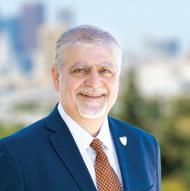
We recently signed a memorandum of cooperation with National Cheng Kung University in Taiwan that creates two new interdisciplinary degree program options for students in the high-demand fields of regulatory science and biomedical engineering, as well as numerous opportunities for international education and research exchanges between the two institutions. Read more about this and our other global collaborations in our cover story on page 12.

This fall, as is typical for the school, approximately one-third of our entering Doctor of Pharmacy class members were born outside the United States. They join a large cadre of international students in all of our degree programs. In fact, the majority of our master’s students come from abroad. And over the summer, more than 50 of their peers from pharmacy programs around the world attended our unique, four-week International Student Summer Program, which integrates the study of drug development, clinical treatment, regulatory science and healthcare marketing while immersing participants in Los Angeles’ dynamic cultural scene.
The school’s location in this vibrant, multicultural city is a distinct advantage in our role as a leading international school for the study of pharmacy in all its many dimensions. No matter what academic program they enroll in, our students leave the school prepared to be leaders in global healthcare.
We also take very seriously our responsibility to learn how healthcare is administered in other countries. For instance, 13 USC undergraduate pharmacy students participating in our Maymester program in Bulgaria, Greece, Romania and Turkey attended planning meetings for a new clinic to help those in need in the Bulgarian village of Stolat (see story on page 16).
In this issue, you’ll meet Samuel Garza, a PhD student who was elected president of the university’s Graduate Student Government (see page 6), where he represents more than 28,000 master’s and doctoral students. We pay tribute and say farewell to two renowned and dedicated alumni and supporters of the school who passed away this year, Frank DeWight Titus III and Joseph Litvack (see pages 18–19). We also highlight a few outstanding research endeavors by our faculty and introduce the recipients of the 2023 Alumni Awards as well as two new members of our Board of Councilors.
Thank you for your friendship and support, which helps fuel our global impact.
Computer illustration of the brain’s neural network. Social isolation during the COVID-19 pandemic exacerbated anxiety disorders. Long-term effects of anxiety can include the cognitive decline of Alzheimer’s and other dementia disorders. New research from the USC School of Pharmacy sheds light on the issue and may hold potential for protecting the brain. See story on page 24.

1 RESULTS FALL 2022
Vassilios Papadopoulos, DPharm, PhD, DSc (hon) Dean, USC School of Pharmacy John Stauffer Decanal Chair in Pharmaceutical Sciences
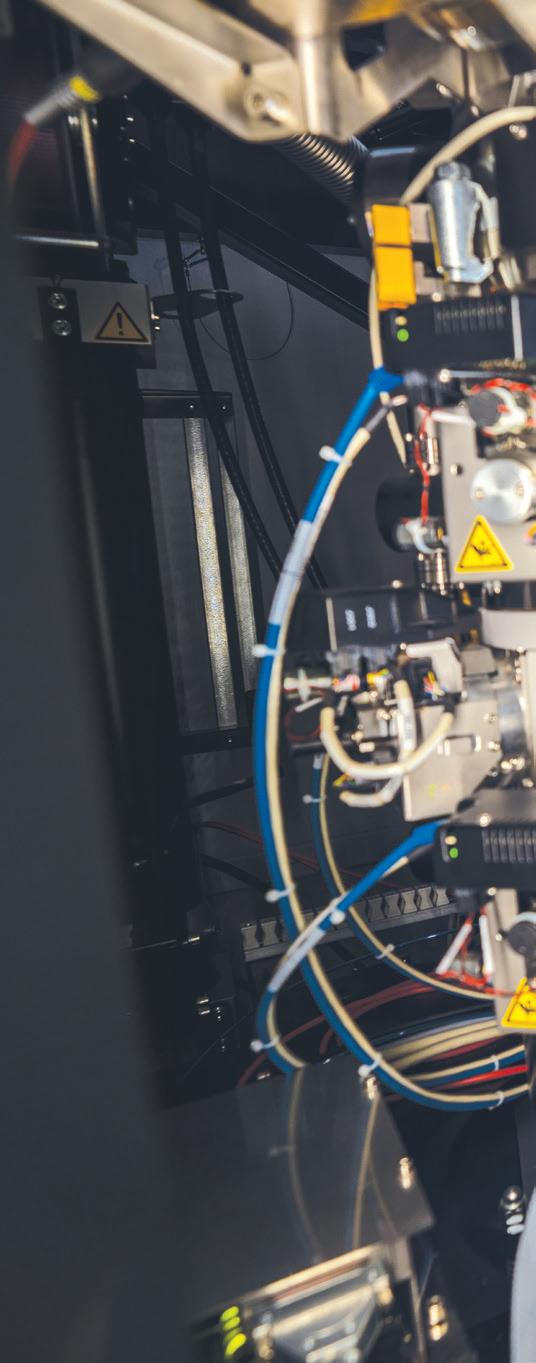
2 USC SCHOOL OF PHARMACY Contents Broad Spectrum 4 / ENHANCING DIVERSITY IN ADDICTION SCIENCE 5 / LET PHARMACISTS PRESCRIBE COVID-FIGHTING PILLS 6 / FIRST IN CLASS: SAMUEL GARZA 8 / NEW BILES LEADERSHIP CENTER OPENS 9 / BARRIERS TO CONTRACEPTION ACCESS—EVEN IN BLUE STATES 10 / DRUGMAKERS AREN’T DRIVING INFLATION 11 / BUILDING ON A STRONG FOUNDATION: UPDATED STRATEGIC PLAN Cover Story 12 / EXPANDING HORIZONS: INTERNATIONAL IMPACT 15 / GLOBAL PERSPECTIVE: TERRENCE GRAHAM 16 / JOURNEY TO THE BALKANS Giving 18 / IN MEMORIAM: FRANK DEWIGHT TITUS III 18 / APHA IMMUNIZATION CHAMPION AWARD 19 / BOARD OF COUNCILORS WELCOMES NEW MEMBERS 19 / REMEMBERING JOSEPH LITVACK Alumni 20 / PRECEPTORS RECOGNIZED 21 / HONORING LEADERSHIP: 2023 ALUMNI AWARDS 22 / CLASS NOTES Faculty 24 / REDUCING NEUROINFLAMMATION 25 / NEW FACES 26 / BARGAINING OVER GENERICS 26 / MENTORING AWARD 27 / PHARMACY BENEFITS YOUTH MENTAL HEALTH Students 28 / PHARMD CLASS OF 2026 BEGINS JOURNEY 28 / MOVING TARGETS: FOCUSING ON PHARMACOGENOMICS 29 / NATIONAL HISPANIC PHARMACISTS ASSOCIATION STUDENT CHAPTER 29 / CLASS OF 2022 SETS NEW HIGH IN RESIDENCY MATCHES 30 / COMMENCEMENT 2022 31 / STUDENT TEAM PLACES IN TOP FIVE AT AMCP COMPETITION 32 / PHOTO SHOP
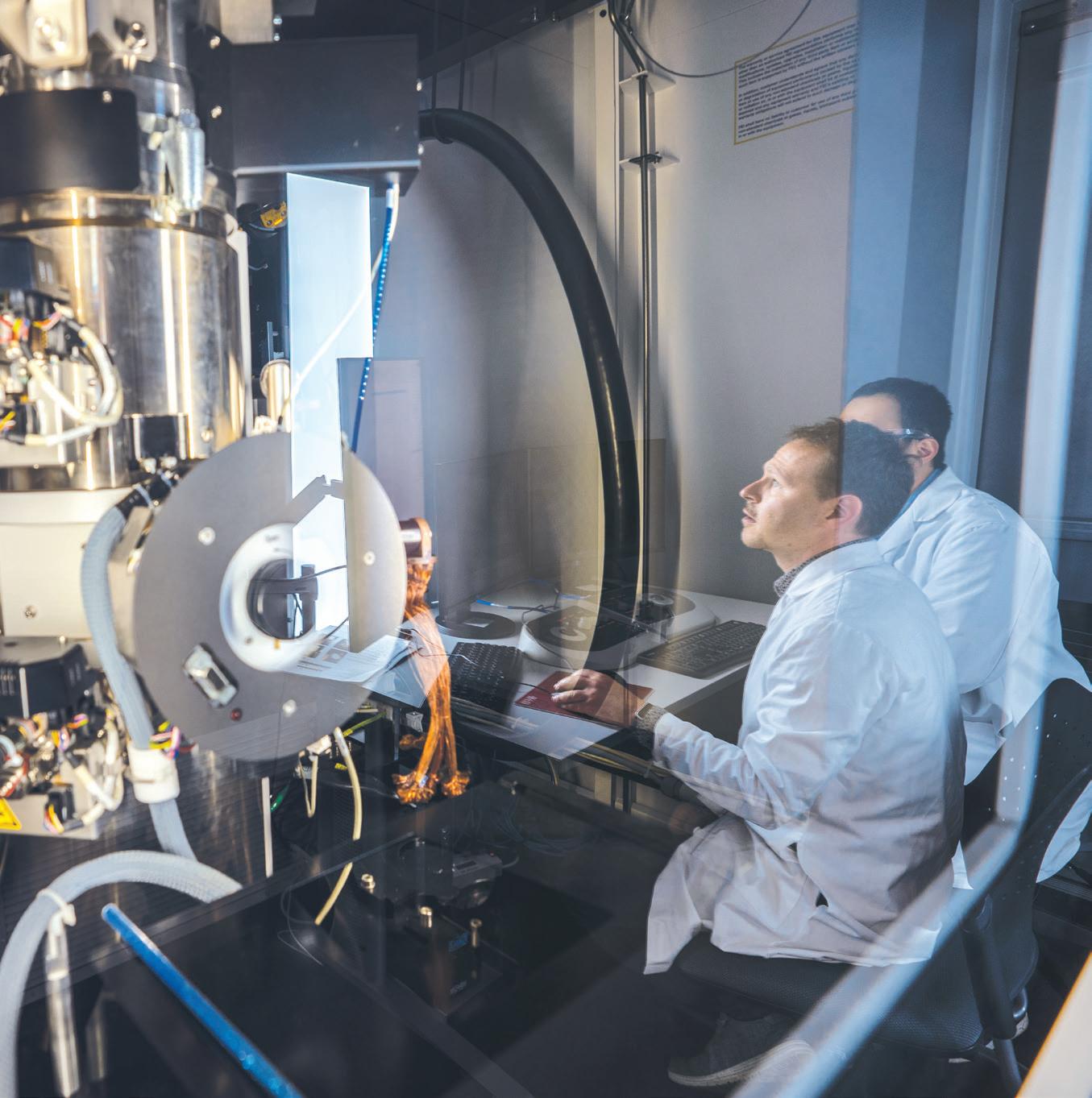
3 RESULTS FALL 2022
Assistant Professor of Pharmacology and Pharmaceutical Sciences Paul Seidler—shown above with postdoctoral fellow Jinliang Wang at work in the USC Michelson Center—focuses his research on solutions to address Alzheimer’s disease. “Advances in imaging and computer processing have made it possible for us to test candidate medicines by watching them as they engage pathologically clumped proteins from Alzheimer’s patients,” Seidler says. “This will help us refine our design process to make effective medicines.”
ENHANCING DIVERSITY IN ADDICTION SCIENCE
USC is partnering with California State University, Los Angeles (CSULA) and Charles R. Drew University of Medicine and Science (CDU) on a new $1.3 million, five-year training grant from the National Institute on Drug Abuse to create a first-ofits-kind program to enhance diversity in the next generation of addiction scientists.
This innovative, transdisciplinary program will train under graduate students from underrepresented minorities in the fields of alcohol and substance use disorders. The program, Rising STARS (Scientific Training in Alcohol Research and other Substances), will be led by Daryl Davies, associate dean of undergraduate education at the School of Pharmacy.
“Our mission is to develop the creativity and intellectual talents of our most motivated undergraduate students and enrich future addiction science research through their participation,” says Davies, associate director of the USC Institute for Addiction Science. The institute unites experts from the Keck School of Medicine of USC, USC School of Pharmacy, USC Suzanne Dworak-Peck School of Social Work and other affiliated schools at USC as well as clinical centers that study and treat addiction.
The five-year educational and research experience program will recruit students from USC, CSULA and CDU. Rising STARS scholars will have the opportunity to train in preclinical, human laboratory, clinical, public health and policy approaches at USC under the direction of faculty mentors from a breadth of disci plines. Although Rising STARS scholars may ultimately choose to specialize in a specific area of addiction science, they will be
exposed to many diverse applications to increase appreciation for the complexity of addiction and stimulate creative thinking that cuts across disciplines. After completing the program, scholars will be eligible for guaranteed interviews, select slots of PhD entry and application fee waivers at USC graduate schools.
“Our graduates will be poised to matriculate into PhD programs at USC and other leading universities that excel in addiction research,” says Davies, who is also director of the Alcohol and Brain Research Laboratory at the School of Pharmacy and the Timothy M. Chan Professor of Complementary Therapeutics.
Advancing Science on Addiction and Its Consequences Substance abuse and overdose deaths have been on the rise for years in the United States but they surged amid the COVID19 pandemic, particularly among communities of color, U.S. Centers for Disease Control and Prevention data shows.

Vassilios Papadopoulos, dean of the USC School of Pharmacy, notes that the grant comes at a time when substance use and addiction are at record levels in the United States, and yet access to treatment remains elusive for millions of Americans.
“Addiction science and the problem of addiction touch across just about every possible field in academics,” says Adam M. Leventhal, professor of preventive medicine and psychology at Keck School of Medicine and USC Norris Comprehensive Cancer Center, and founding director of the USC Institute for Addiction Science. “It’s difficult to think of a field where it’s not relevant.”
4 USC SCHOOL OF PHARMACY BROAD SPECTRUM
Let Pharmacists Prescribe COVID-Fighting Pills
By Vassilios Papadopoulos
Prevention measures against COVID-19—masks, shutdowns, social distancing—are running out of steam. As we entered the summer and fall seasons, COVID transmission and infections rates were going back up. Vaccines still play a major role, but if we ever hope to drive COVID hospitalization and death rates down to lower levels, we need to accelerate access to therapies that neutralize the virus once we contract it.
As dean of the USC School of Pharmacy, I see a stockpile of very effective antiviral medica tions building up on the shelves. Patients aren’t getting them because not enough prescriptions are being written. The answer is to let pharmacists join physicians and other health professionals in prescribing COVID-fighting pills.

The Food and Drug Administration (FDA) granted emergency-use authorization to two oral medications in December: Paxlovid by Pfizer and Lagevrio by Merck. Paxlovid’s clinical trial showed an 89% reduction in the risk of hospi talization and death and is generally preferred over the Merck pill, which some studies showed reduced the risk by only 30%. Pfizer also says new studies show that Paxlovid is effective against the omicron variant. Most people who take it are not likely to experience serious side effects.
Paxlovid was hard to find earlier in the year, but no longer. Pfizer says it will produce 120 million courses of the medication by the end of the year. Supply and distribution are widespread, including availability at most pharmacies.
The complication occurs when you try to get a prescription.
The FDA has restricted prescriptions to a limited set of authorized providers—including physicians, advanced practice registered nurses and physician assistants—and they are being bombarded with requests. They must confirm that the person had a positive COVID-19 test result, be at high risk of advancing to a severe stage, be symptomatic and not be taking medications that could interact adversely with Paxlovid.
All of these requirements are best met by an in-person appointment, although telehealth visits can work in some cases. Either way, time is of the essence. The therapy needs to start within five days of developing symptoms to prevent the virus from turning into a truly serious case.
Recognizing the time crunch that could occur, the government set up 2,200 test-to-treat sites where people showing symptoms could get tested and receive the drug right away if the result was positive.
But 66,000 additional sites could be doing the same thing if the FDA would allow pharmacists to write Paxlovid prescriptions.
Pharmacists are already on the front lines of the fight against COVID. They have been adminis tering tests since early in the pandemic and have dispensed over 80% of the COVID vaccines in the U.S. They know their customers’ medication histories. They often help determine risk for life-threatening conditions such as heart attack, stroke and asthma attack, and initiate or adjust treatment accordingly. They have been trusted with similar duties in previous public health crises, such as independently initiating and furnishing flu treatment, HIV prophylaxis, Centers for Disease Control and Prevention–recommended immuniza tions, and medications for opioid overdose.
Health officials in Québec granted Paxlovidprescribing authority to pharmacists on April 1.
A news report said 513 prescriptions were filled there in the two weeks prior to the authorization. During the first 18 days of April, more than 3,000 Paxlovid prescriptions were filled in Québec, two-thirds of them written by pharmacists.
U.S. physician groups traditionally guard prescription authority. But COVID remains a national emergency. Pharmacists are the medication experts and are in the best position to evaluate drug-to-drug interactions that are a key step in dispensing these COVID-fighting pills.
If the FDA opens the door, state boards of pharmacy would likely follow quickly with approvals. U.S. pharmacists could then get trained and start making an immediate impact on COVID illnesses. Contracting the virus will never be pleasant, but if we can include our local pharmacists, we don’t have to be part of a new wave of hospitalizations and deaths this fall.
This article was originally published in Marketwatch on June 15. It has been edited for Results
ON JULY 6, THE FDA REVISED EMERGENCYUSE AUTHORIZATION FOR PAXLOVID TO INCLUDE STATE-LICENSED PHARMACISTS.
5 RESULTS FALL 2022

6 USC SCHOOL OF PHARMACY BROAD SPECTRUM
First in Class
Samuel Garza went from being a first-generation college student to earning entry as a PhD candidate in Molecular Pharmacology and Toxicology at the USC School of Pharmacy. He has since marked another milestone by becoming the first student in the school to serve as president of USC’s Graduate Student Government. Here he discusses his research, student leadership duties—and why he treasures his acceptance letter to USC.
What sparked your interest in pharmaceutical science?
While an undergraduate at Cal State Los Angeles, I took a special topics class on careers in biotech and pharmaceutical sciences. We had guest speakers with expertise in drug development, regula tory affairs, patent law and other areas. I didn’t yet know what I wanted to do with my career, but I found these topics fascinating and wanted to learn more about them.
What attracted you to the USC School of Pharmacy?
When researching graduate programs, I found the USC School of Pharmacy to be the most success ful at placing its graduates into industry positions. The faculty expertise, curriculum and network at the school really position students for success.
You work in Dean Vassilios Papadopoulos’ lab and are soon to publish some of your research. What can you tell us about it?

My research explores the role of mitochondrial dysfunction in the testosterone decline of aging men. I hypothesized that if we enhance mitochondrial activity, we may be able to restore steroid hormone production in cells that are deficient in steroid biosynthesis. I identified a preexisting compound designed to enhance mitochondrial function and used it in my experiments. The data suggest that this treatment can enhance steroid hormone production in compromised Leydig cell models.
What’s next for this project?
I’ve designed animal studies where I will treat aging rats with the compound and measure their ste roid hormone production. This will tell us whether targeting mitochondrial function is a sustainable model for maintaining testosterone formation as men age.
Somehow, you find time to balance your research with your student leadership role. What do your duties as president entail?
As president, I’m the lead advocate for the more than 28,000 graduate and professional students at USC. This involves communicating with university administration and managing projects that en hance the graduate student experience. I’m proud to work with a strong leadership team—including Senior Vice President Elisa Stephens, who is also a School of Pharmacy PhD student.
How did it feel to address an audience of more than 8,000 at the USC New Student Convocation and what did you discuss?
It felt exhilarating. I thought about my academic journey and how my experience might help others— especially how I got past the difficult moments throughout my journey. When I arrived at USC, I felt anxious and overwhelmed by the academic pace and new environment. But one thing kept me grounded: my acceptance letter. So, as I said to my fellow students that day: “Whenever you are feeling overwhelmed, think back to that acceptance letter, because by gaining admission to USC, we’ve all accomplished something incredible.”
7 RESULTS FALL 2022
New Biles Leadership Center Opens


A student-centric, technologically advanced facility that conve niently houses student services, counseling, admissions and financial aid all in one location opened in time for the fall 2022 semester. The renovation project in Seaver Hall established a new home for the Margaret and John Biles Leadership Center, created
through a generous gift from Ninetta and Gavin Herbert. The new facility also offers students space for activities, relaxation, and meetings and collaboration. Numerous donors contributed to refurbishing and reimagining the new Seaver Hall location, adjacent to the school’s Stauffer Pharmaceutical Sciences Center.
8 USC SCHOOL OF PHARMACY BROAD SPECTRUM
Signage at the new Biles Leadership Center
Associate Dean for Academic and Student Affairs Kari Franson leading students on a tour of the new facility
BARRIERS TO CONTRACEPTION ACCESS—EVEN IN BLUE STATES
The U.S. Supreme Court’s June decision in Dobbs v. Jackson Women’s Health Organization, which struck down Roe v. Wade, is expected to lead to bans or severe restrictions on abortion in more than half of all U.S. states.
“In many of these states, the legislation is so sweeping, it will also impact emergency contra ceptives like Plan B—also known as the morningafter pill—and possibly prescription birth control,” says Dima M. Qato, Hygeia Centennial Chair at the School of Pharmacy and a senior fellow at the USC Schaeffer Center for Health Policy & Economics.
States like California can expect a dramatic increase in demand as women cross state lines to receive reproductive care. “One estimate from the Guttmacher Institute predicts people seeking abortion services or contraceptives in California will increase by 3,000%—from 46,000 to 1.4 million people annually,” Qato says.
Barriers to Reproductive Care

Even in states without contraceptive restrictions, barriers exist to accessing Plan B. In California, pharmacists may deny emergency contracep tives to customers who don’t have a prescription, Qato notes.
Research she and colleagues published in Health Affairs in 2020 demonstrates the resulting disparities in access. “We found that only 1 in 10 pharmacies in Los Angeles County provided phar macist-prescribed contraception, and even fewer pharmacies provided this service for women and girls living in predominantly Black or Latinx and low-income neighborhoods—including those with high unintended pregnancy rates,” she says.
Even if all pharmacies implemented pharma cist-prescribed contraception, many adolescent girls and undocumented immigrant women could still encounter barriers to accessing it, she explains. “We found that nearly three-fourths of
pharmacies impose identification and age restric tions not required by law,” she says.
And while the Affordable Care Act requires insurance providers to cover contraception, these protections do not apply to the uninsured, who may be unable to afford the $40–50 cost per pill for Plan B.
Policy Solutions Needed
“While well-intentioned, dispensing mandates only help women who secure prescriptions,” Qato says. “Most women traveling from a state with restrictive access to drugs like Plan B will likely not be able to get a prescription.” So in addition to dispensing mandates, she suggests the use of Title X funding to cover contraceptive costs for low-income or uninsured women.
“Women are likely already traveling to states like California to purchase contraception,” Qato says. “They should not face the additional burden of barriers at the pharmacy counter.”
9 RESULTS FALL 2022
DRUGMAKERS AREN’T DRIVING INFLATION —AND PRICE CONTROLS WOULD HINDER MEDICAL INNOVATION
 By Dana Goldman and Erin Trish
By Dana Goldman and Erin Trish
As inflation has worsened, the Biden ad ministration and its allies have focused attention on an old bogeyman: reducing prescription drug prices. Democratic Sen. Joe Manchin of West Virginia recently told an AARP gathering that “If we do nothing more this year, that’s the one thing that must be done.” On NBC’s Meet the Press, former Treasury Secretary Lawrence Summers singled out government negotiation of drug prices as one of the “most important” policies to control inflation.
It’s time for a reality check. The consumer price index rose 8.6% in May compared with a year earlier. Household spending on prescription drugs rose only 1.9% over the same period. In the last quarter of 2021, net prices for medicines— after subtracting rebates, discounts and
fees—dropped 0.7%, the largest quar terly decline in 15 years. If other products such as eggs (up 32%), gasoline (up 49%) and used cars (up 16%) had behaved like drugs, inflation would be completely under control.
Drug prices are an attractive political target, but the campaign to control them relies on a misunderstanding of how they work.
Large pharmaceutical benefits manag ers, or PBMs, negotiate prices with drug companies on behalf of insurers and employers. In exchange for placing drug companies’ products on insurance formu laries, PBMs secure billions of dollars in rebates to pass on to patients. The problem is, they often keep those rebates to themselves. The net effect is that consumers pay more than they should.
Insulin is a prime example. PBMs have pocketed outsize rebates while makers of insulin products have seen their net prices decrease. Meanwhile, higher copays are becoming prohibitively expensive for some patients. In March, the House approved a $35-a-month cap on insulin copays for patients on Medicare or in private insurance plans, and the Senate was considering a matching bill.
Capping out-of-pocket costs makes sense. That is, after all, what insurance is designed to do. But capping list prices— as some in Congress have proposed— makes no sense, and wouldn’t effectively tamp down inflation. Instead, such a restriction would perversely encourage manufacturers to launch new drugs at higher prices (since they can’t raise them in the future) and discourage innovation.
10 USC SCHOOL OF PHARMACY BROAD SPECTRUM
What, then, should Congress do? First, it should seek to make drug markets as efficient and competitive as possible. It’s under those conditions that unit costs will be most affordable. One way to ensure that is by continuing to support the stepped-up Food and Drug Administration (FDA) drug-approval process, which has accelerated in recent years. As new brand-name drugs are allowed to compete with rival drugs—and new generic versions of existing drugs enter the market—prices will inevitably fall.
Second, policymakers should advo cate adopting global measurements of value, rather than only cost. Take the drug that eliminated hepatitis C virus. At first, governments and private insurance
payers resisted adopting it because of its relatively high unit cost. In the short run, that preserved budgets and kept prescrip tion-drug inflation lower. But in the long run, we lost thousands of lives and added hundreds of billions of dollars to health care costs. Making a drug’s value the priority in real-world settings—notwith standing its initially high costs—will aid innovation for other treatments, such as cancer and Alzheimer’s, and improve the return on the dollars we do spend.
The COVID vaccination process was instructive. To make sure everyone had access, the federal government bought the vaccines en masse. The FDA sped its approvals. And the result was wide spread uptake and dramatically reduced
mortality rates. The effect of reimbursing care on the basis of value rather than price and preserving access to that care was especially favorable.
The right combination of pharmaceutical polices will create incentives for innova tion and allow market-based competition to defuse price inflation. Advocating price controls—and misreading inflation numbers for political gain—will only take us in the wrong direction.

Dana Goldman and Erin Trish are co-directors of the USC Schaeffer Center for Health Policy & Economics and faculty members at the School of Pharmacy. Goldman is also dean of the USC Price School of Public Policy. This op-ed ran in the July 7 issue of the Wall Street Journal.


Building on a Strong Foundation
School Unveils Updated Strategic Plan to Transform the Face of Pharmacy
Over the past five years, the School of Pharmacy commu nity implemented an ambitious and wide-ranging strategic plan that strengthened the school’s capacity to fulfill the growing needs of the field and bolster its role spanning the entire pharmaceutical spectrum—from laboratory discovery to clinical care and from health policy and economics to regulatory science. Now, the school has updated the plan for 2023–2027 to further enhance its ongoing efforts to transform the face of pharmacy.
While many of the overarching goals and strategies remain consistent with the previous plan, the updated version leverages and expands on the advances and learnings of the past five years. It also strengths the school’s commitment to wellness and to diversity, equity and inclusion.
Read the full plan at pharmacyschool.usc.edu/strategicplan.

11 RESULTS FALL 2022
Erin Trish
Dana Goldman
EXPANDING

12 USC SCHOOL OF PHARMACY
HORIZONS
by Susan L. Wampler
As part of a global university consistently ranked among the top U.S. institutions for international-student enrollment, the USC School of Pharmacy has engaged for decades in academic and scientific exchanges with partners from around the world. With a current total of 50 such alliances, these relationships now extend throughout Asia, Europe, Australia, South America, the Middle East and Africa.

“The field of pharmacy knows no borders,” says Terrence Graham, chief international officer and associate dean for graduate education and postdoctoral studies. “International experiences help USC School of Pharmacy students develop the knowledge, skills and attitudes to excel as global healthcare professionals.”
Dean Vassilios Papadopoulos adds: “In addition to our worldwide connections, with our location in Los Angeles, an
economic hub for the Pacific Rim, we are uniquely positioned as a bridge between East and West. Our Office of Global Initiatives advances the strategic goals of the School of Pharmacy and the uni versity, enhances the learning experience of our students and strengthens the school’s reputation as a global leader. And through our network of international partners, the school is advancing the health of communities worldwide.”
13 RESULTS FALL 2022
Educational and Cultural Exchange

For more than 30 years, the school’s regulatory science program has fostered meaningful global exchanges, includ ing training and courses on the ground in China, Korea, Ethiopia and other locations, while welcoming students and faculty from overseas for short- and longterm visits to Los Angeles. Meanwhile, faculty across the school collaborate on research with peers around the world.
Today, USC pharmacy students benefit from a wide range of international experi ential, service-learning and research opportunities, while their foreign peers are drawn to the school’s innovative International Student Summer Program (ISSP)—a four-week course that integrates learning in drug development, clinical treatment, regulatory science and health care marketing.
Yasi Mojab, a dual-degree PharmD and MS in Pharmaceutical Sciences student, helped facilitate ISSP over the past two years. The experience has even led her to consider a career in academia. “The mentorship I received as a course assis tant for the program has shaped me into a leader and has broadened my global perspective on pharmacy,” she says.
The program is also transformative for participating international students.
“This program is very unique and has introduced me to various areas in phar macy that I never knew existed,” says Donghyun Kim, a student at Kyung Hee University in South Korea.
Anujith Geetha Sekhar, a student at Manipal Academy of Higher Education in India, adds: “Learning about the different approaches to pharmacy in various countries has been fascinating. I’m considering returning to USC in the future to pursue one of the many programs the school offers.”
Learning about the different approaches to pharmacy in various countries has been fascinating. I’m considering returning to USC in the future to pursue one of the many programs the school offers.”
ANUJITH GEETHA SEKHAR , Manipal Academy of Higher Education, India
Yi Ting (Judy) Wu participated in ISSP in 2017 when she was a PharmD student at Taipei Medical University. That summer experience piqued her interest in regula tory science and led to her return to USC to pursue an MS in the field. “USC has achieved great success in international efforts in providing various learning opportunities and bringing in more young talent from around the world,” she says.
In addition, USC’s new Graduate Certificate for Advanced Pharmacy Practice program provides a pathway to residency or licen sure for non-U.S.-trained pharmacists with advanced degrees.
International Student Body
The USC School of Pharmacy’s many degree programs remain a magnet for international students—and for their domestic counterparts who want to gain a thoroughly global perspective on the field of pharmacy. As is typical for the Doctor of Pharmacy program, 60 of the 177 entering students in the Class of 2026
14 USC SCHOOL OF PHARMACY
hail from foreign countries, including Armenia, Indonesia, Iran, South Korea, the United Kingdom and Vietnam. Roughly a third of each PharmD class includes students born outside the U.S. In addition, most of the school’s master’s students come from abroad.
Ronak Shethia, a second-year MS in Pharmaceutical Sciences student originally from Mumbai, says the school’s interna tional reputation, global partnerships and diverse culture of students influenced his decision to enroll here.
“USC is well-recognized globally and has always made sure that all international students feel comfortable and included,” he says. “My peers from different coun tries have also shown me a glimpse of their traditions, culture, food, art and music, and I am so grateful for the experience.”
First-year MS in Management of Drug Development student Ema Rajić grew up in Illinois but retains a strong affinity with her parents’ home country of Croatia—so much so that she competed as a swimmer on the Croatian national team at the 2021 Tokyo Olympics. Like Shethia, she was attracted to USC by the school’s global impact. She says she feels inspired by those who travel from overseas to pursue degrees at the university.
“I love learning about people, why they’re interested in their field and what brought them here from the other side of the world,” Rajić says. “I think USC is pretty exemplary in that global aspect of educa tion, and that’s exactly the environment I want to be in.”
First-year PhD student Sara Abdel-Hamid took part in the school’s predeparture orientation for international students before leaving her native Egypt, which she says helped ensure a smooth transition. “USC offers a community of people from different backgrounds coming from around the world,” she says. “Having exposure to
GLOBAL PERSPECTIVE
While a high schooler in Dayton, Ohio, Terrence Graham saw his world open up when a teacher inspired him to study Russian literature. As chief international officer for the USC School of Pharmacy, he helps connect students to opportunities to learn from other cultures as the school’s leadership in pharmacy education, research and practice continues growing in global impact. Here, he discusses the school’s worldwide reach and what it means.
What makes the school’s global reach so important for students?
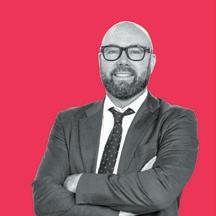
International experiences help them understand how different cultures approach healthcare, which will make them better pharmacists, healthcare leaders, scientists, regulatory affairs professionals and health economists because they can understand where people are coming from—especially in a region as diverse as Southern California.
How do global initiatives support other aspects of the school’s mission?
Our global reach includes always looking for multiple touchpoints of collaboration, and our partnerships include institutions in Taiwan, India, Brazil and Mexico. It’s not just about study-abroad exchanges but also about our teaching and research projects and other outreach. For example, in May, I traveled with six USC PharmD students to Bulgaria to provide input on a new healthcare clinic being developed there. While there, we actually met up with Terry Church and his undergraduate Maymester students (see story on page 16).
Does this go both ways? What about students from other countries who come here?
We’re seeing an increase in international students coming into the PharmD program, and we welcome them. This distinguishes us from many other pharmacy schools, which don’t enroll international students in their PharmD programs due to complications with licensing. I’ve heard numerous students say our international program is what really attracted them to USC. Meanwhile, our International Student Summer Program draws students from around the world to campus—including more than 50 in 2022.
What is your main g oal in your capacity as chief international off ic er for the school?
I want to ensure that the School of Pharmacy’s international dimension becomes ever more integral to everything that happens here—from teaching and research to clinical practice.
15 RESULTS FALL 2022
Participants in the Maymester program enjoy a break in Varna, Bulgaria.

JOURNEY TO THE BALKANS
As many of their peers prepared for summer vacation, 13 USC School of Pharmacy undergraduates traveled throughout southeastern Europe for the Maymester class Balkan History, Geography and Folk Medicine. The 20-day trip was led by course instructor Terry David Church, assistant director of undergraduate education and a faculty member in the school’s Department of Regulatory and Quality Sciences.
The itinerary took students through parts of Bulgaria, Greece, Romania and Turkey to explore folk medicine’s evolutions, benefits and consequences as well as sustainability. “We also learn about the cultures, histories and experiences of the people in these countries,” Church says of the course.
Stone & Compass—a nonprofit educational and cultural organization that partnered with USC in offering the trip—hosted the students at its 2,000acre property in the Balkan Mountains and helped coordinate excursions.
Highlights included a botanical and bee farm tour that detailed the healing
properties of honey and local herbs, and a trip to a hot spring in Greece to learn about hydrothermal medicines. The students also learned about the medicinal properties of regional plants from professors at the Istanbul University Faculty of Pharmacy in Turkey, Carol Davila University of Medicine and Pharmacy in Romania, and Medical University of Sofia Faculty of Pharmacy in Bulgaria.
“This trip really opened my eyes to the endless possibilities and applications of plants in the world of medicine,” Pharmacology and Drug Development (PDD) student Jack Saville says. “Every professor at the universities we visited stressed how important it was for their pharmacy students to be able to identify plants that could be used to help treat patients.”
Recent PDD graduate Samantha Skinner adds that she was fascinated to learn about the terms “pharmacognosy” and “phytopharmacology,” both of which relate to the study of medicines from plant sources. “Pharmacists in other parts of the world take botany
classes and familiarize themselves with the therapeutic properties of plants—something pharmacists in the U.S. don’t have much knowledge about,” she notes.
Students also attended planning meetings for a new clinic being built in the Bulgarian village of Stolat by Stone & Compass, which is committed to building global partnerships and projects that help those in need.
Second-year PDD student Mikey Null gained perspective into the challenges arising from how the region’s natives view traditional Western medicine.
“Running a small healthcare clinic is much more complex than I had initially thought,” Null says. “We had to learn how to cater to both Western and folk medicine, without excluding one or the other in meeting health needs.”
“Travel is a phenomenal way of learning new things. It builds creativity and makes for a more dynamic thinker,” Church says.
16 USC SCHOOL OF PHARMACY
such diversity is a unique and eye-opening experience. USC is one of the top universi ties that anyone dreams to join.”

Preparation for Global Practice

PharmD students in their P4 year can choose an International Advanced Pharmacy Practice Experience (APPE) to fulfill an elective, six-week rotation. In collaboration with the Professional Experience Programs office, the Office of Global Initiatives is building upon existing partnerships to expand the number and diversity of destinations open to students for APPEs. Recent placements have included universities in Japan, Ireland, China and Taiwan. Future destinations may include Egypt, India, Bulgaria, Colombia and Kenya, according to Graham. Shorterterm Global Pharmacy Experiences enable students to explore the practice of phar macy in various international settings.
Yijun Cai, PharmD Class of 2025, who hails from China, says these programs “fully immerse students into foreign health systems to offer firsthand experi ence in global health challenges.”
Samer Sultan, PharmD Class of 2024, conducted a research internship this summer with the College of Pharmacy at the University of Sharjah in the United Arab Emirates, where he worked on datacollecting tools and translated patient education materials from English to Arabic for a new prediabetes program.
“I also got exposed to the community pharmacy practice by spending a day training in a community pharmacy,” he says. “It was a huge opportunity for me to grow and expand my knowledge. As an Egyptian and Middle Easterner, it was a privilege to participate and to give back to my community.”
A global perspective is also integrated into coursework at the school. “The cur riculum includes how to respect cultural and religious differences, and the skills needed to work in a multidisciplinary
team,” notes Julia Wang, PharmD/Health care Decision Analysis Class of 2024.
“For a regulatory professional, working cross-functionally and even globally is getting more demanding nowadays. Hav ing peers from around the world with various backgrounds is extremely helpful,” adds Wu, who says she learned a lot about drug regulations in India and Korea by connecting with classmates from those countries.
Strong International Presence
With more than 400,000 members of the Trojan Family worldwide, the USC Alumni Association has a large and growing international program, including 26 inter national clubs in locations ranging from Sao Paulo to London to Taipei. USC also maintains nine international offices. Trojan pharmacists similarly span the globe.
The most recent addition to the school’s international portfolio is a partnership with National Cheng Kung University in Taiwan for both undergraduates and mas ter’s students in biomedical engineering and regulatory science. The innovative joint degree programs come at a time of rapid growth for the biomedical industry, filling a large—and largely unmet—inter national demand for regulatory profes sionals.
The school continues to seek new opportu nities to expand international collabora tions. “The pharmacy field is global, and our graduates must be, too,” Graham says.
USC is wellrecognized globally and has always made sure that all international students feel comfortable and included. My peers from different countries have also shown me a glimpse of their traditions, culture, food, art and music, and I am so grateful for the experience.”
17 RESULTS FALL 2022
RONAK SHETHIA , a second-year MS in Pharmaceutical Sciences student
IN MEMORIAM:
Frank DeWight Titus III
Longtime Board of Councilors member Frank DeWight Titus III, PharmD ’58, died in May at age 88.

He came from a long line of Trojans and pharmacists, one of seven relatives to graduate from USC. Titus was exposed to the profession at an early age and devel oped an instant affinity. When the time came, his decision to attend pharmacy school at USC was not a difficult one.
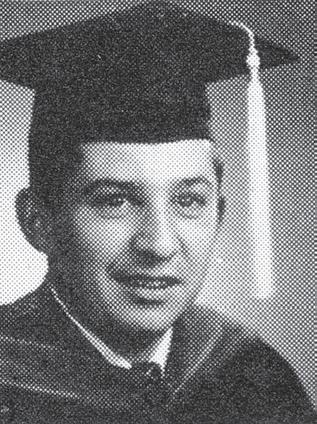
“A pharmacy career was my birthright,” he said. “As a student, I enjoyed being part of the transition from compounding to contemporary pharmacy practice.”
Titus and his sister Susie Titus made a substantial gift in 2004 to name the Titus Family Department of Clinical Pharmacy at the school. At the time of the gift, he said: “Our family would not have achieved the same degree of success without the USC School of Pharmacy. With this gift, we are honoring our family and the satisfaction they had with their pharmacy careers.”
Titus began working in the family pharmacy business, F.D. Titus & Son, in 1958. After a post-graduate service in the military, he helped the family open two additional California pharmacies, in Santa Ana and Compton. In 1971, Titus left his position at the Santa Ana location to focus solely on the medical/surgical supply part
of the company, influencing countless other local and regional distributors for decades.
“I enjoyed the sales aspect of the business,” he said. “We supplied nurs ing homes and physician groups with everything from bandages to exam tables to sophisticated surgical equipment. By the time we sold the company to General Medical, it was one of the largest physician supply companies of its kind.”
Titus joined General Medical as vice chair, executive vice president and a director, retiring in 1997 when the company was acquired by McKesson Corp. He also served as chairman of the Health Industry Distributors Association (HIDA) and its Education Foundation, and is credited with creating the annual HIDA Executive Conference. He was inducted into the HIDA Hall of Fame in 2021 and earned HIDA’s John F. Sasen Award in 1986 when it was called the Industry Award of Distinction, the organization’s highest honor.
“Over my career, I came to realize how valuable a PharmD degree is to individuals pursuing a career in healthcare,” he said. “I was exposed to so many avenues within the profession. My goal is for students today to explore the opportunities available to them, particularly in management positions.”
APhA Recognizes School with Immunization Champion Award
The American Pharmacists Association (APhA) honored the USC School of Pharmacy and City of Los Angeles’ COVID-19 Vaccination Program with its Immunization Champion Award, honorable mention, in the corporation/ institution category in March.
USC pharmacists took a lead role at California’s first COVID-19 point of dispensing (POD) site at Lincoln Park, across the street from the USC Health Sciences Campus. As the city’s COVID-19 vaccination distribution accelerated, USC pharmacists continued leading efforts at high-volume vaccina tion sites, including the nation’s largest POD at Dodger Stadium.
“At the core of the city’s program, the USC School of Pharmacy served as a key partner that placed pharmacists at the center of its operational, logistical and clinical decisions,” says Richard Dang, assistant professor of clinical pharmacy.
Ultimately, more than half of the 1.5 million immunizations adminis tered through the city’s COVID-19 vaccine program were distributed at USC-supported sites. Other partners in the unique public-private collabo ration included the Los Angeles Fire Department, the nonprofit Community Organized Relief Effort (CORE), Carbon Health and Curative.
18 USC SCHOOL OF PHARMACY GIVING
Remembering Joseph Litvack
BOC WELCOMES NEW MEMBERS
Two industry executives recently joined the School of Pharmacy’s Board of Councilors.
David Meek is CEO of Mirati Therapeutics, a clinical-stage biotech nology company focused on bringing forward therapies that address areas of high unmet need, including lung cancer. He has more than 30 years of industry experience, during which he has held various global executive leadership positions in large phar maceutical and commercial-stage biotechnology companies focused on oncology, including as CEO of Ipsen. He has also served on the boards of Pharmaceutical Research and Manufacturers of America
and the European Federation of Pharmaceutical Industries and Associations. He currently serves on the boards of uniQure NV and Entasis Therapeutics Holdings Inc.

Chao Peng is chief financial officer of Freeze Holdings (China). She is responsible for supervising and managing the company’s strategic development, pre-investment evalua tion and post-investment management of various projects. Previously, as branch general manager of Centaline Property Consultants Co. Ltd., she was responsible for the planning and marketing management of dozens of real estate projects and transactions as well as the company’s business expan sion in mainland China.

William A. Heeres, PharmD ’63, longtime board leader who stepped down as chair earlier in 2022, has been named chair emeritus.
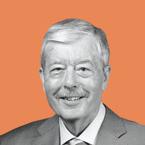
Left: Joseph Litvack with his daughter, Marsha (left), and wife, Shirley; Right: Shirley and Joseph Litvack
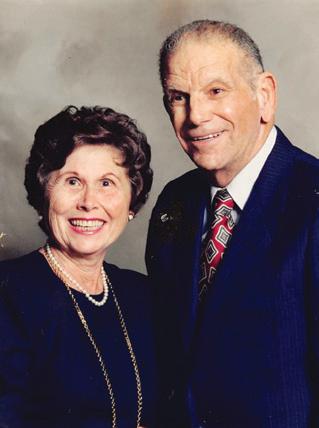

Joseph Litvack, PharmD ’59, passed away in June at age 99, less than one month before his 100th birthday. During his career, he served as head pharmacist for Rancho Los Amigos National Rehabilitation Center. Among his legacies is the establishment of the Litvack Family Chair to Discover Consequences of Aging with a $3 million
gift to the USC School of Pharmacy. The faculty member named to the endowed chair will conduct research on how people age differently based on genetics, lifestyle and environmental factors—and potentially develop new therapeutics that can mitigate the physical changes that cause some indi viduals to die prematurely.
SAVE THE DATE
MONDAY, NOVEMBER 7
The first USC School of Pharmacy and QSAD golf tournament will be held at the beautiful Mission Viejo Country Club. The event will give alumni and friends the chance to reconnect while raising funds for student scholarships. Contact Cheryl Stanovich at stanovic@usc.edu for details.
19 RESULTS FALL 2022
Preceptors Recognized
More than 400 preceptors, volunteer faculty and clinical-site tutors provide USC School of Pharmacy PharmD students with mentorship and supervision in diverse phar macy practice settings throughout Greater Los Angeles each year. At a reception at the Jonathan Club in Downtown Los Angeles in June, the school recognized five individuals and one clinical site for their dedication to providing this vital hands-on training.
This commitment was more important than ever given the challenges of clinical training during the COVID-19 pandemic.
“It was under your supervision and guid ance that students were able to continue to receive training and practice pharmacy, gaining invaluable experiences they will carry with them for the rest of their careers,” said Ying Wang, director of the Office of Professional Experience Programs.
This year’s preceptor award recipients were:
» Aaron Denowitz, PharmD, Providence Saint Joseph Medical Center: Best Advanced Pharmacy Practice Experience Preceptor
» Edward Lee, PharmD, Vermont V.O. Pharmacy: Most Knowledgeable Preceptor
» Brian Ma, PharmD, LAC+USC Medical Center: Best Introductory Pharmacy Practice Experience Preceptor
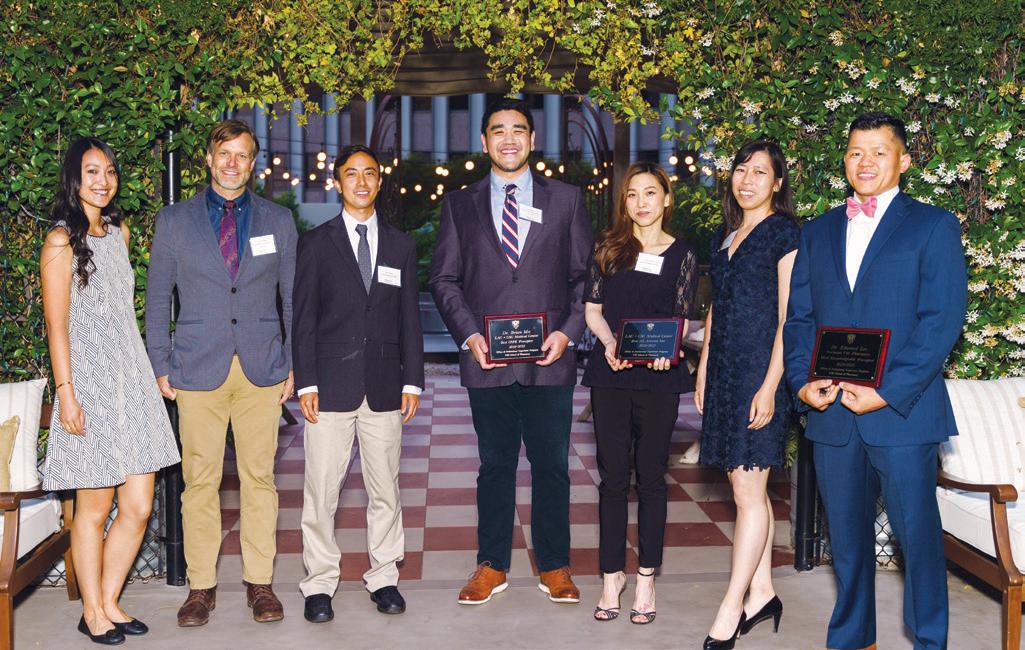
» Shushma Patel, RPh, MBA, The Prescription Shop: Excellence in Communication
» Sandra Pineda, PharmD, Hubert H. Humphrey Comprehensive Health Center: Most Innovative Preceptor
» LAC+USC Medical Center: Best All-Around Site
It was under your supervision and guidance that students were able to continue to receive training and practice pharmacy, gaining invaluable experiences they will carry with them for the rest of their careers.”
Ying Wang, director of the Office of Professional Experience Programs
20 USC SCHOOL OF PHARMACY ALUMNI
Samantha Yeung, Scott Mosley, Kevin Brady, Brian Ma, Catherine Chan, Jessica Lin and Edward Lee were among the preceptors honored at the June reception in Downtown Los Angeles.
HONORING LEADERSHIP: 2023 Alumni Awards




Seven outstanding pharmacy leaders will be recognized at the annual USC School of Pharmacy Alumni Awards Gala, to be held February 26, 2023, at the Westdrift Manhattan Beach Hotel.
The Dean’s Medallion Award will be presented to Richard Dang, PharmD ’13, assistant professor of clinical pharmacy and director of the residency program at the USC School of Pharmacy, and president of the California Pharmacists Association. During the COVID-19 pandemic, Dang was a leading voice for testing and vaccination, notably heading the Los Angeles COVID-19 program that resulted in nearly 1.5 million vaccines administered across the city.
The Innovation in Regulatory Science Award will go to Duane Mauzey, DRSC ’12 , director of regulatory affairs for chemistry, manufacturing and control at Glaukos Inc., where he oversees quality of clinical and marketing applications for novel pharmaceuticals that treat chronic eye diseases. He also is an adjunct assistant professor at the USC School of Pharmacy.
Jimmie L. Overton, PharmD, will receive the Honorary Alumni Award. He is co-founder and managing partner at Govise Inc. and previously served as vice president of global medical information and medical promotional review at Allergan. A recognized medical affairs subject matter expert, he has more than 25 years of experience in healthcare.
Jeffrey S. McCombs, PhD, will be presented with the Innovation in Pharmacoeconomics Award. In 1994, he and colleagues established the nation’s first—and now most prestigious—graduate program in pharmaceutical economics. Earlier this year, McCombs retired after more than three decades on the faculty of the USC School of Pharmacy.

Charles W. Stark , PharmD ’82 , will receive the Research Achievement Award. He is senior vice president of research and development at Emmaus Medical Inc. He previously held roles at immunotherapeutic companies Bavarian Nordic and Dendreon and at pharmaceutical company Pfizer. He is an assistant professor at the USC School of Pharmacy and has been an Advanced Pharmacy Practice Experience preceptor since 1991.
David Truong, PharmD ’07, MS Regulatory Science ’07, will receive the Distinguished Alumni Award. He is director of global regulatory affairs at Jazz Pharmaceuticals in San Diego. Previously he was director of regulatory affairs at Greenwich Biosciences and at Teva Pharmaceuticals. He also practices in a community pharmacy setting at Costco Wholesale. Truong has precepted and mentored students and serves as an adjunct faculty member at the USC School of Pharmacy. He is also a trustee of the California Pharmacists Association and a board member of USC’s QSAD Centurion.


The Young Alumni Award will go to Lilia Xu, PharmD ’12 , vice president of business development for 986 Degrees Corp., which operates several pharmacies in the San Gabriel Valley and has provided more than 40,000 COVID-19 vaccinations to the community. Xu is a member of the boards of the San Gabriel Valley Pharmacists Association and QSAD Centurion at the USC School of Pharmacy.
Finally, the Community Service Award will be presented to all those who volunteered at vaccination clinics during the COVID-19 pandemic in honor of their outstanding work in the community. USC School of Pharmacy faculty, students and alumni played a key role in vaccinating Angelenos against COVID-19. They joined fellow volunteers in inoculating more than 1 million people during the height of the pandemic, selflessly volunteering many hours at vaccine points of dispensing throughout Greater Los Angeles.

21 RESULTS FALL 2022
class notes
We want to hear from you! Submit your updates and career news to pharmacyschool.usc.edu/class-notes to be included in the next edition of Class Notes.
1960 s
Thomas Pierce, PharmD ’60, is a pharmacist at ASAP Pharmacy in Glendale, California.
Arthur Escovedo, PharmD ’61, recently retired.
Sylvia Moore, PharmD ’61, is a compounding and marketing consultant based in Orange County, California.
1970 s
Cheryle Vickers, PharmD ’70, recently retired.
Barry Bauling, PharmD ’71, is a consultant in healthcare communications and facilitation based in Los Angeles.
Karen Milligan, PharmD ’72, is a director of pharmacy at Los Alamitos Medical Center.
Lawrence Plon, PharmD ’72, is a pharmaceutical sciences professor at University of California, Irvine.
Lawrence Cohen, PharmD ’78, was named a Distinguished Professor at the University of North Texas Health Science Center in Fort Worth. A retired professor of pharmacotherapy, he continues to work as an adjunct professor and consultant.
1980 s
John Ahn , PharmD ’80, is a pharma cist at Spring Park Pharmacy in Long Beach, California.
Rodney Chin , PharmD ’80, is a phar macist consultant at Becton, Dickinson and Company in San Diego.
Raymond Wong, PharmD ’82 , is an executive director at Urovant Sciences.
Connie Kim , PharmD ’85 , is a pharmacist at The Remedy Pharm in Torrance, California.
1990 s
Kathleen Black , PharmD ’90, is a clinical pharmacist at Dignity Health Sierra Nevada Memorial Hospital in Grass Valley, California, and is pursu ing board certification in medication therapy management. She previously served as a medication safety officer for Rideout Memorial Hospital in Marysville, California.
Benjamin Schatzman , PharmD ’96, is a principal of U.S. strategy at Market Access Transformation.

Samy Shalaby, PharmD ’97, is a pharmacy manager at The Medicine Cabinet Pharmacy in Bell, California.
Bela Desai Pael, PharmD ’98, is a pharmacist health coach at Wholistic Pharmacist.
2000 s
Caroline Burk , MS Pharmaceutical Economics ’00, is a health outcomes and clinical research consultant based in Orange County, California.
ALUMNI
22 USC SCHOOL OF PHARMACY
Andrea St. Hill , PharmD ’01, is a senior clinical consultant at UnitedHealth Group.
Eric Sirich , PharmD ’04 , is an investment advisor representative at Transamerica Financial Advisors Inc.
Sofia Gezalyan , PharmD ’06, is the director of inpatient pharmacy services at CHA Hollywood Presbyterian Medical Center.
Christine Gobran , PharmD ’06, is a clinical pharmacist at USC Norris Healthcare Center.
2010 s
Nick Mordwinkin , PhD Pharmaceutical Sciences ’12 , is a senior director of corporate development at Gilead Sciences.
Yalda (Dorosti) Akasheh , PharmD ’13, is an outpatient pharmacy supervisor at Kaiser Permanente in Downey, California.
Ani Altounian , PharmD ’14 , is an advanced practice pharmacist at Facey Medical Group. She and her husband, Dickran, welcomed a son, Andrew Jack Altounian, in February 2022.
Laressa Bethishou , PharmD ’14 , is an assistant professor of pharmacy practice at Chapman University School of Pharmacy.
Thao Bui , MS Management of Drug Development and Regulatory Science ’14 , is a regulatory affairs manager at Adagio Medical Inc.
Karin Kharloubian , PharmD ’15 , is a managed care clinical pharmacist at Facey Medical Group.
Yilong Li , PhD Pharmaceutical Sciences ’16, is a director of medical chemistry at Peplib.
Weiyi Ni, MS Pharmaceutical Economics and Policy ’17, is a director at Jazz Pharmaceuticals.
Grant Dagliyan , Doctor of Regulatory Science ’18, is an associate director of research administration and operations at Cedars-Sinai.
Johannes van Dijk , PhD Pharmaceutical Sciences ’18, is a scientist at Debut Biotech.
Marl Ayson , PharmD ’19 , is a clinical pharmacist at Los Angeles County Department of Mental Health.
Eric Pinashin , PharmD ’19 , is a medical education manager at MannKind Corporation.
Alexandra Silva , PharmD ’19 , is a pharmacist at Providence Sacred Heart Medical Center in Spokane, Washington.
2020 s
Craig Luis, PharmD ’20, MS Regulatory Science ’20, is a senior regulatory affairs associate at Gilead Sciences.
Nathan Nguyen , PharmD ’20, is an oncology pharmacist at City of Hope in Huntington Beach, California.
Mincheol Park , PhD Pharmaceu tical Sciences ’20, is a scientist at Sanofi.
John Beckford , PhD Clinical and Experimental Therapeutics ’21, is a scientist at Takara Bio USA Inc.
Ronald Deng, MS Healthcare Decision Analysis ’21, PharmD ’22 , has joined Peregrine Market Access, a full-service consulting, communica tions and commercialization partner for the life sciences industry, as a content strategist.

Wenzhe Feng, MS Healthcare Decision Analysis ’21, is a data business analyst at AbbVie.
Vincent McIntosh , PharmD ’21, is a clinical pharmacist at Paragon Healthcare Inc. in Denver.
Malika Salimova , MD, MS Clinical and Experimental Therapeutics ’21, is a primary care physician at Central Clinical Hospital in Almaty, Kazakhstan.
Hugo Avila , PhD Translational and Pharmaceutical Sciences ’22 , is an advisor at Eli Lilly and Company.
Daniel Liu , BS Pharmacology and Drug Development ’22 , is an associate in the Amgen Career Discovery Program.
Neysa Sanghavi, BS Pharmacology and Drug Development ’22 , has been appointed honorary advisor for health, women and child develop ment, and forests for the government of Goa, India.
Neil Wang, MS Healthcare Decision Analysis ’22, is an investment banking analyst intern at Morgan Stanley.
Nana Yeboah , PharmD ’22 , is a regulatory affairs manager at AbbVie.
IN MEMORIAM
Paul Kalemkiarian , BS Pharmacy ’50, MS Pharmacy ’52, died in June at age 93.
Eliseo “Sam” Samaniego, PharmD ’60, died in January at age 86.
Nedra Jensen , PharmD ’80, died in July at age 71.
Jordan Cohen died in June at age 79. He served as a faculty member at the USC School of Pharmacy from 1969–1988 with an active clinical pharmacology research program in cancer, AIDS and geriatrics therapy.
23 RESULTS FALL 2022
Reducing Neuroinflammation

24 USC SCHOOL OF PHARMACY FACULTY
USC School of Pharmacy research shows broader potential of drug that shields the liver from effects of alcohol use.
After previously demonstrating how dihydromyricetin (DHM) shields the liver from effects of alcohol use, USC School of Pharmacy faculty members Jing Liang and Daryl Davies are now shedding light on its potential to protect the brain from dementia. This research is especially timely, given the long-term effects of COVID-19 lockdowns. The resulting social isolation led to increases in anxiety disorders that are expected to continue long after the pandemic recedes into history.
This rising prevalence is itself a cause of worry, the researchers note, as anxiety disorders already account for nearly a third of our nation’s mental health spending. And the long-term effects of anxiety can include the cognitive decline associated with Alzheimer’s disease and other dementia disorders—which are also escalating in incidence.
“Social isolation heightens stress and anxiety, which contribute to neuroinflammation,” Liang says. In turn, neuroinflammation, which stems from the brain’s attempts to protect the central nervous system, is a driving factor in Alzheimer’s and other neurodegenerative conditions.
“Even though anxiety-reducing medications are available, they can have substantial side effects and often fail to overcome treatment resistance or prevent relapse,” adds Davies, director of the Alcohol and Brain Research Laboratory, and one of the leaders of the new USC Institute for Addiction Science.


Microglia, the resident macrophages of the brain’s innate system, are key players in modulating the neuroinflammatory response in the central nervous system, Liang says. “Microglia are not only involved in nervous-system infection and debris phagocytosis but also play a crucial role in the physiological development of the brain by engaging in the shaping process of neuronal circuits and synapse plasticity,” she adds. Homing in on astrocytes—major microglia cells that regulate brain function—as a probable mechanism in social isolation-induced anxiety, Liang, Davies and their colleagues are exploring DHM as a more effective means of stopping the condition. “Our prior research revealed DHM’s positive effects on the brain’s gamma-aminobutyric acid (GABA) receptors, which are charged with inhibiting neuronal excitability,” Liang explains. “The current work explored the hypothesis that astrocytes are involved in the pathway of GABAergic
Daryl Davies, Timothy M. Chan Professor of Complementary Therapeutics
Maddalena Ferranna , PhD, has joined the Department of Pharmaceutical and Health Economics as an assistant professor. She previously was a research associate at the Harvard T.H. Chan School of Public Health. Her main research interests are welfare economics, global health and climate change economics, particularly the development and application of methods to assess the equity implications of health and environmental interventions. She received a PhD in economics from Toulouse School of Economics and was a values and public policy postdoctoral fellow at Princeton University.
transmission,” which activates the receptors and cognitive formation.
This research, published in the Journal of Neuroinflammation and Scientific Reports, used a trauma- and stressor-related-disorder mouse model to determine the level of neuroinflammation triggered by isolation-induced stress. “Along with deficits in cognition and memory, we found that social isolation decreased the size and complexity of astrocytes in the hippocampus,” Liang says.
Not only did administration of DHM improve cognitive and memory abilities, but it also restored the plasticity and functionality of astrocytes.
Although more studies are needed before this research can move to clinical trials, it both confirms the roles of microglia and astrocytes in isolation-induced cognitive impairment and demonstrates the potential of DHM as an effective therapy. However, note Liang and Davies’ team, early interventions will remain essential if cognitive dysfunctions and dementia disorders are to be averted.
This continuing research was supported by the National Institutes of Health.
Dimitris Sakellariou , MBA , has joined the USC School of Pharmacy as chief operating officer, overseeing all financial and administrative operations, including ongoing evaluation, analysis and reporting of performance against strategic priorities. He was most recently assistant vice president for student affairs operations at the California Institute of Technology. He earned an MBA from the USC Marshall School of Business, a master’s degree in electrical engineering from Caltech, a master’s degree in engineering from ETH Zurich and a business process management certificate from Pepperdine University.
25 RESULTS FALL 2022
NEW FACES
Even though anxiety-reducing medications are available, they can have substantial side effects and often fail to overcome treatment resistance or prevent relapse.”
Bargaining Over Generics
Generic prescription drugs are supposed to be a bargain, but a USC study reveals that many patients are actually paying more than they should. Co-authored by School of Pharmacy Associate Professor Erin Trish and alumnus Robert Popovian, PharmD ’93, MS Pharmaceutical Economics and Policy ’92, the white paper also suggests solutions for cutting retail prices.
cash-only pharmacies rise in popularity by cutting out the PBM middleman. “Although only a small percentage of prescriptions are paid for in cash to bypass insurance, the vast majority of such purchases are for generic drugs,” Trish explains. “And since cash payments generate no claims data, this could dry up a source of information that’s important for care coordination.”
Mentoring Award
Tien M.H. Ng, interim chair of the Titus Family Department of Clinical Pharmacy, was among the recipients of the 2022 USC Mentoring Award, which recognizes faculty who exemplify the best in mentoring activities and programs, creating environments that further the academic success of students and faculty.
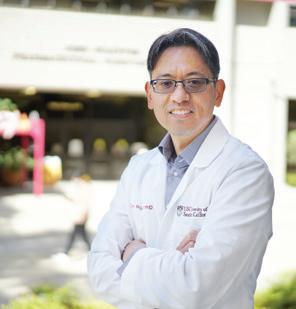
Compared to branded drugs, generic medications save money for the U.S. healthcare system overall. But those savings are not flowing to consumers.”
Erin Trish, Co-Director, USC Schaeffer Center
Instead, note the authors, pharmacy benefit managers (PBMs) are reaping these financial benefits to boost insurance company profits. The tactics used include copay clawbacks, which pocket the difference when a patient’s copayments exceed the drug’s cost to the insurer; spread pricing, when PBMs charge higher prices to health plans than the amount reimbursed to pharmacies; and formulary designs that favor branded drugs over gener ics because of the lucrative rebates offered by brand-name manufacturers.
Beyond higher consumer costs, the researchers are concerned these practices could lead to long-term consequences as
To ensure that consumers are treated fairly while avoiding industry disruption, the researchers suggest regulations to restrict rebate contracting, reforming formulary tiers to steer patients toward cost-effective generics rather than high-profit brands, requiring transparent PBM reporting and putting fixed fees in PBM contracts to remove the incentives for choosing higher-priced drugs.
The paper also calls for policies that include antitrust measures to improve the PBM market, imposing fiduciary duties so that PBMs act in the best interests of patients and not just shareholders, and giving employers and government purchasers audit rights to determine the actual amounts paid by PBMs.
“Increasing transparency could lower consumer costs without affecting the profits that drive pharmaceutical innovation,” Popovian says. “I’m pleased to have collab orated on this paper because it’s an example of the positive impact my alma mater has on healthcare policy.”
The white paper was published by the USC Schaeffer Center for Health Policy & Economics, a partnership of the School of Pharmacy and the USC Price School of Public Policy. The paper builds on previous work led by Trish showing that, in 2028, Medicare paid $2.6 billion more for generic medications than the amount spent by cash-paying Costco members on the same drugs.
26 USC SCHOOL OF PHARMACY FACULTY
PHARMACY BENEFITS YOUTH MENTAL HEALTH
Despite increased public funding and awareness, access to mental healthcare remains limited for many vulnerable groups—especially young people. On average, only one specialized psychiatrist is available for every 10,000 children needing mental health services nationwide. Even when treatments are available, medication safety in children and adolescents remains a public health challenge.

USC School of Pharmacy faculty members Julie Dopheide and Steven Chen contributed to a review paper offering a solution to this shortfall: Add pharmacists to mental health teams. Their piece for the journal Child and Adolescent Psychiatric Clinics of North America explains the importance of interdisciplinary collaboration between phar macists and child psychiatrists to achieving better outcomes for patients.
“Youth are increasingly prescribed psychiatric medications, and they are vulnerable to drug interactions and adverse effects and need special monitoring and education on the benefits and
potential risks,” says Dopheide, professor of clin ical pharmacy in the Titus Family Department of Clinical Pharmacy and a board-certified psychiatric pharmacist. For example, youth are more sensitive to certain antipsychotic side effects such as weight gain, Type 2 diabetes and muscle spasms. Sedation from some psychiatric medications may impact performance in school.
She notes that collaboration between child psychiatrists and pharmacists can lead to improved medication outcomes through appro priate medication selection, dosing, monitoring, and ongoing patient and family education. School of Pharmacy students and residents already collaborate with child psychiatry treatment teams during their introductory and advanced pharmacy practice electives, exposing them to career oppor tunities in mental health, Dopheide adds.
Some medications have been more thoroughly studied in youth than others, and having a pharmacist provide comprehensive medication management will
help ensure optimal care, explains Chen, associate dean for clinical affairs and the William A. Heeres and Josephine A. Heeres Chair in Community Pharmacy. Chen also founded the California Right Meds Collaborative, which is devoted to improving medication use across specialties.
Recognizing the critical need for comprehensive medication management in psychiatric care, Chen adds that numerous states and counties are expand ing pharmacists’ roles in the specialty. Policymakers in California, Indiana, Texas and other states have also partnered with pharmacists to issue pediatric psychotropic guidelines or practice parameters.
The authors bolstered their findings with three case studies illustrating the difference that psychi atric pharmacists and comprehensive medication management made in the lives of patients between 10 and 16 years old with conditions such as schizo phrenia, severe depression, ADHD and autism spectrum disorder.
27 RESULTS FALL 2022
PharmD Class of 2026 Begins Journey
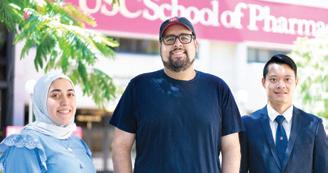
The 177 members of the PharmD Class of 2026, hailing from 18 coun tries, officially began their journey to becoming Doctors of Pharmacy on August 19 at the school’s annual White Coat Ceremony. Some 37% of students are the first in their family to attend college.

Jean Pallares, PharmD ’84, chief pharmacy officer for Los Angeles County Department of Health Services (pictured above, right), served as keynote speaker. She noted that never before in history
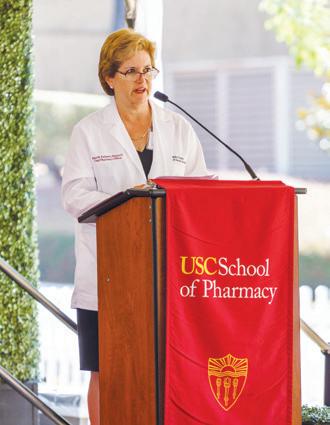
has the profession of pharmacy been more relevant. “The pathways and opportunities are endless and new options and roles for phar macists emerge constantly,” she said.
The ceremony culminated with the administration of the Oath of a Pharmacist, led by Melissa Durham, assistant dean of diversity, equity and inclusion, who noted that the oath was revised this past year to incorporate values of diversity, equity, inclusion and access.
FOCUSING ON PHARMACOGENOMICS
“The World of Code: The Impact of Pharmacogenomics and Computational Methods on Pharmaceutical Science” was the theme of this year’s Moving Targets multidisciplinary symposium, held August 18. The event’s goals are to communicate cutting-edge innovations and progress of technologies being used in the development of stem cell therapies and to foster interac tion between graduate students and leading scientists, innovators and policymakers from academia, industry and government.
Speakers were Houda Alachkar of the Titus Family Department of Clinical Pharmacy at the USC School of Pharmacy; Steven Altschuler of the Department of Pharmaceutical Chemistry at University of California, San Francisco; Ferhat Ay of La Jolla Institute for Immunology, an affiliate of
University of California, San Diego; Aparna Bhaduri of the Geffen School of Medicine at UCLA; Ryan Logan of Boston University School of Medicine; Nicholas Mancuso of the Center for Genetic Epidemiology at the Keck School of Medicine of USC; and Noam Morningstar-Kywi, PharmD, MS in Pharmaceutical Sciences ’21, a scientist at Simulations Plus.
Winners of the Young Investigator Awards (pictured right) were Rayyan Aburajab, an MS in Clinical and Experimental Therapeutics student, Mario Alba, a PhD candidate in Molecular Pharmacology and Toxicology, and Alvin Phan, a PhD candidate in Pharmaceutical Sciences.
The event is organized by the American Association of Pharmaceutical Scientists (AAPS) USC student chapter and attracts
nearly 200 attendees annually. This year’s sponsors were AAPS, Abbvie, USC Graduate Student Government, the Ming Hsieh Institute for Research on Engineering-Medicine for Cancer, the Keck School of Medicine, the Alfred E. Mann Institute for Biomedical Engineering, Miora, the USC Norris Comprehensive Cancer Center, Oxygen Club of California and Vertex.
28 USC SCHOOL OF PHARMACY STUDENTS
STUDENTS LAUNCH NATIONAL HISPANIC PHARMACISTS ASSOCIATION STUDENT CHAPTER
Students at the USC School of Pharmacy have launched the National Hispanic Pharmacists Association (NHPA) student chapter under the National Hispanic Health Foundation. The new USC NHPA chapter was created in partnership with USC’s affinity group Latinx Advancing in Pharmacy (LAP).
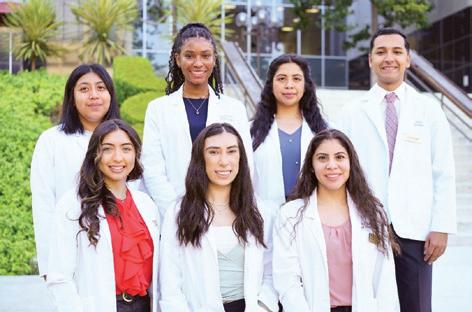
The National Hispanic Health Foundation (NHHF) was estab lished in 1994 in Washington, D.C., under the National Hispanic Medical Association to support educational and research opportunities that benefit the health of the Hispanic population. In 2018, NHHF founded NHPA to empower Latino pharmacists and other healthcare providers to promote health education and equitable services in the pharmacy setting.
NHPA and LAP will collaborate to empower current and future Latino student pharmacists and lead efforts to improve the health of Hispanics and other minority groups facing health disparities. Members will gain professional opportunities, networking experience and educational resources to help prepare for their futures as healthcare professionals. NHPA and LAP are dedicated to serving communities in need while also encouraging greater representation of minority groups within the healthcare workforce.
“We are beginning to reach out to high schools and under graduate programs to coordinate seminars and mentorship programs for students who may be interested in a healthcare profession,” says Ieeshiah Otarola, NHPA vice president. “There is a lack of representation of Hispanics among healthcare work ers, and we want to change that narrative.”
NHPA will be advised by faculty members Chris Muñoz, adjunct lecturer of clinical pharmacy, and Rebecca Romero, lecturer of pharmacology and pharmaceutical sciences.
“We are very proud of our PharmD students for taking initiative to launch the NHPA student chapter at the School of Pharmacy,” Muñoz says. “NHPA will definitely have a positive impact on the school and in local communities.”
CLASS OF 2022 SETS NEW HIGH IN RESIDENCY MATCHES
Allison Flores, PharmD ’22
The USC School of Pharmacy matched 83.7% of the 2022 PharmD class who participated in the American Society of Health-System Pharmacists Match with postgraduate year-one (PGY1) residency programs. USC graduates achieved a considerably higher acceptance rate than the national average of 77%. The match level also represented a major jump from the school’s 2021 rate of 63.5%.
“This marks our highest match rate since 2017,” says Lisa Goldstone, director of residency programs, adding that USC consistently beats the national average. Besides the high percentage of recent alumni who will hold PGY1 residencies at a range of top California healthcare institutions, graduates were accepted into residency programs in New York, Massachusetts, Nevada, Washington state, Texas and North Carolina.
“More of our students applied to out-of-state programs this year,” says Goldstone, noting that the USC School of Pharmacy PharmD program opens opportunities everywhere.
Goldstone considers the school’s Residency Candidate Mentoring Program (RCMP) to be a factor in USC’s continued rise in successful PGY1 applications. “The RCMP spans our entire PharmD program,” she says of the initiative, which she created three years
ago with Paul Wong. “But the 2022 class is the first to be exposed to the RCMP starting in their P2 year.”
This is important, Goldstone notes, because “there are things that students should be doing early in their PharmD to become more competitive as PGY1 candidates when they reach their fourth year.”
RCMP offers students general information and support on residency programs and how to apply to them as well as tips on putting together their CV and letter of intent and preparing for interviews. P4 students also have the option of being matched to a resi dent mentor for individual feedback.
According to Class of 2022 graduate Allison Flores, now a PGY1 pharmacy resident in the ambulatory care setting at USC: “The program was really great in organizing all the important deadlines and providing guidance on when we should start working on each section of the application. The guidance from Drs. Goldstone and Wong provided me with a better understanding of what to expect.” She also found the resources such as practice questions helpful in preparing for interviews. Flores was later selected to serve on this year’s American College of Clinical Pharmacy National Resident Advisory Committee.
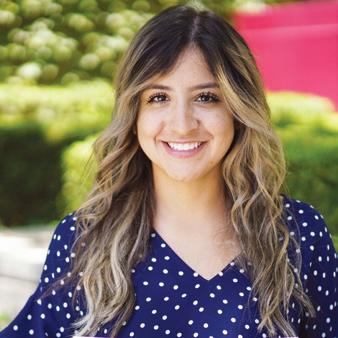
29 RESULTS FALL 2022
Back: Melissa Martinez (LAP representative), Ieeshiah Otarola (vice president), Jasmine Lopez (historian), Gilberto Peña (president); Front: Maya Ruiz (event coordinator), Nathalie Iribe (treasurer) and Danielle Samano (secretary)
The guidance from Drs. Goldstone and Wong provided me with a better understanding of what to expect.”
COMMENCEMENT 2022:
Celebrating Achievement and Embracing the Future
The School of Pharmacy honored its 115th graduating class on May 13 before an audience of more than 2,000 family, friends, faculty and staff. Dean Vassilios Papadopoulos presided over the ceremony and presented degrees to the newly minted pharmacists, pharmacologists, pharma ceutical scientists, health economists and regulatory experts. Daryl Davies, associate dean of undergraduate education, presented the bachelor of science degrees.
George Scangos, CEO of Vir Biotechnology, served as keynote speaker and described the opportunities and challenges that lay ahead for the Class of 2022. “You are entering a world that is dynamic and changing,” said Scangos, who has been
named one of the 25 most influential people in biopharma. “The facts you know now are a fraction of what you’ll need in the future.”
He encouraged the graduates to be continually curious, think critically and move forward confidently. “Stay humble when things are going great; stay resolute when things are not,” he said. “Remember why all of us are doing what we’re doing: to improve the lives of patients who need help.”
Papadopoulos urged graduates to consider the field’s noble heritage while embracing the mission to transform the face of pharmacy. “Today we look forward, not backward,” he said. “As you enter a world of possibilities, changes and uncertainties, always have a purpose that will guide you.”

STUDENT RECOGNITION AWARDS
The following graduates garnered USC Student Recognition Awards for academic excellence, outstanding leadership and significant contributions to the university community.


USC Graduate Student Awards— Order of Arete (pictured left)
Samara White, PharmD
Michelle Kalu, PharmD, PhD Pharmaceutical and Translational Sciences
Jafar Essayli, PharmD
Jasmine Ventenilla, PharmD
Daniella Veloria, PharmD
Undergraduate Student Awards
Evan Makhani, BS Pharmacology and Drug Development
George Emad Michael, BS Pharmacology and Drug Development and BA Biological Sciences
Neysa Sanghavi, BS Pharmacology and Drug Development and BS Human Biology
Samantha Grace Skinner, BS Pharmacology and Drug Development and BA Biological Sciences
Harlan David Tsui, BS Pharmacology and Drug Development and Progressive MS Management of Drug Development
Kristin Wong, BS Pharmacology and Drug Development
30 USC SCHOOL OF PHARMACY STUDENTS
George Scangos
BY THE NUMBERS
of Pharmacy
Doctors of Philosophy (Clinical and Experimental Therapeutics)
Doctors of Philosophy (Health Economics)
Doctors of Philosophy (Molecular Pharmacology and Toxicology)
Doctors of Philosophy (Pharmaceutical Sciences)
Doctors of Regulatory Science
Masters of Science (Pharmaceutical Economics and Policy)
Masters of Science (Health Care Decision Analysis)
Masters of Science (Management of Drug Development)
Masters of Science (Molecular Pharmacology and Toxicology)
Masters of Science (Pharmaceutical Sciences)
Masters of Science (Regulatory Management)
18 Masters of Science (Regulatory Science)
Bachelors of Science (Pharmacology and Drug Development)
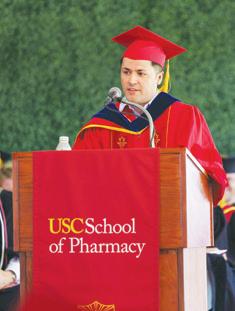
Tiffanie Lin shared how her treatment for non-Hodgkin lymphoma at USC Norris Comprehensive Cancer Center inspired her to study pharmacy.
Lin’s fascination with her body’s response to cancer-fighting drugs, along with “the wonderful treatment and care I received,” cemented her decision, she said.
Lin’s time at the School of Pharmacy included numerous campus leadership positions. She served as president of the Class of 2022, director of mental health outreach for the USC student chapter of the College of Psychiatric and Neurologic Pharmacists, and director of finance for the USC Chinese American Pharmacy Student Association.

Her next step is a pharmacy practice residency at Sharp Chula Vista Medical Center in San Diego. Ultimately, she plans to become a psychiatric pharmacist and work with incarcerated and formerly incarcerated people.
“There is a healthcare issue in correctional facilities, and we need more experienced medical staff members present within those settings,” she noted.
Commencement Spotlight: Hugo Avila, PhD Pharmaceutical and Translational Sciences ’22
Hugo Avila returned to campus from Indianapolis—where he works for Eli Lilly and Company as an adviser in genetic medi cine—to speak on behalf of the 2022 master’s and PhD graduates.
“We persevered through a time that was unprecedented,” he said, noting that pharmaceutical scientists and clinicians made COVID-19 vaccines possible, and adding that “what we do gives people hope.”
While pursuing his PhD, Avila worked full time in the research laboratory of J. Andrew MacKay, associate professor in the Department of Pharmacology and Pharmaceutical Sciences, where he focused on using elastin-like polypeptides to enhance drug delivery to therapeutic targets.
Avila attributes his academic success to the support of his
family, who provided care for his two children while he worked on research. That success included an Eli Lilly internship in San Diego that led to his current position.
Avila’s family, including his children, attended the event to watch him deliver his message and receive his degree.
Student Team Places in Top Five at AMCP Competition
A team of USC PharmD students competed in the final round of the Academy of Managed Care Pharmacy (AMCP) 22nd Annual National Student Pharmacist Pharmacy & Therapeutics (P&T) Competition in Chicago in March. This is the 13th time a USC team has made it to the finals of the P&T competition over the past 22 years.
By participating in the P&T Competition, student pharmacists gain experience in gathering and critically analyzing scientific, clinical and economic evidence in a systematic and rigorous fashion. They also hone written and oral communication skills that are increasingly important in today’s healthcare environment.

31 RESULTS FALL 2022
Commencement Spotlight: Tiffanie Lin, PharmD ’22
Team members Michael Kim, Michelle Um, Renita Moradian and Samvel Nazaretyan with co-faculty adviser Vinson Lee at the AMCP competition in Chicago
199 Doctors
5
4
5
4
10
2
57
9
3
10
2
18
20
33 Residents 20 Fellows
PHOTO SHOP
the year noted in the magazine. While some School of Pharmacy operations remained at UPC, classes began at the John Stauffer
to note that the USC
Center in September 1974, and the building was officially dedicated on November 3 that year. Were you on campus in the 1970s? Share your story at pharmcom@usc.edu.

32 USC SCHOOL OF PHARMACY
A few close-reading alumni—including John Baca , PharmD ’79 , and Andrew C. Gregory, PharmD ’78—wrote to Results regarding the Pharmacies Timeline (page 16) in the spring
2022 issue
School
of Pharmacy’s relocation from the University Park Campus (UPC) to the Health Sciences Campus took
place several years earlier than 1977,
Pharmaceutical Sciences
GROW YOUR LEGACY
Alumni and friends are helping new generations of students blossom and flourish by making scholarship gifts to the school. All scholarship donations of $500 or more include the opportunity to name a leaf on the new David and Sheila Makhani Family Legacy Tree. Lilia Xu , PharmD ’12 , recently made such a gift.

As a past beneficiary of student scholarships I understand the impact that this financial support can have on a student’s ability to focus on academics. I believe in passing on to future generations the generosity that others have afforded me.”
—Lilia Xu, PharmD ’12, Vice President, Business Development, 986 Degrees Corp.
To add your own leaf to the tree, contact Chief Development Officer Cheryl Stanovich at stanovic@usc.edu.

USC School of Pharmacy Health Sciences Campus University of Southern California 1985 Zonal Avenue Los Angeles, CA 90089-9121
STAY IN TOUCH! Share news, update contact info and follow us on social media.
Nonprofit Organization US Postage Paid
University of Southern California
 Plans for the new USC Pharmacy location in South Los Angeles, shown here in
Plans for the new USC Pharmacy location in South Los Angeles, shown here in
a
rendering, continue to take shape. The new pharmacy, the school’s sixth, is scheduled to open in 2023.
 PUBLISHED
PUBLISHED














 By Dana Goldman and Erin Trish
By Dana Goldman and Erin Trish
















































 Plans for the new USC Pharmacy location in South Los Angeles, shown here in
Plans for the new USC Pharmacy location in South Los Angeles, shown here in
